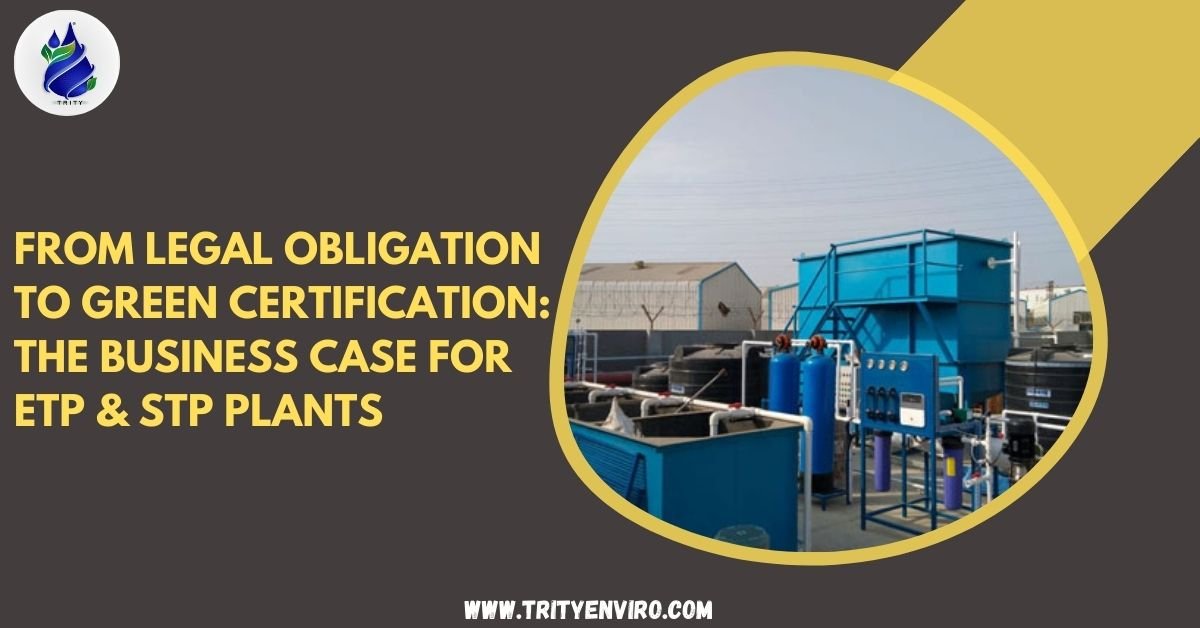
Introduction
Business no longer has the option of skirting the issue of environmental protection; it’s now a legal necessity. The industries must meet Environmental regulations and therefore have necessary tools Effluent Treatment Plant (ETPs) and Sewage Treatment Plants (STPs). Transporting these systems will aid in wastewater treatment, protect the environment and help prevent pollution, and support the concept of sustainable development. Apart from the compliance, ETPs and STPs can help gain green certification, strengthen brand reputation and reduce costs.
Understanding ETP & STP: Key Components of Sustainable Business Operations
Industrial and domestic wastewater is treated to safe discharge standards by ETPs and STPs. It is ETPs that deal with the undesirable industrial waste containing harmful chemicals, oils, and toxins. Sewage and domestic wastewater are removed from other impurities, including pathogens and organic matter, by STPs. Advanced physical, chemical, and biological treatments are used in both systems. Suitable for reuse or safe disposal, treated water is created. Businesses are thereby entitled to reduce their consumption of water and achieve their sustainability goals.
All local governments in the world impose laws restricting water pollution. People do not follow such laws, and they face penalties, closures, and lawsuits. Wastewater will only be allowed to be discharged into the stream as per the discharge limit set by the pollution control board of the industries generating wastewaters. The regulations that require effluent treatment plant process and STP installation ensure compliance. Companies can avoid environmental damage and legal trouble by treating wastewater before discharging it. Using these plants is an indication of responsible operations.
Green Certification: Enhancing Brand Value Through Sustainable Practices
ETPs and STPs require upfront investments, but they save huge sums of money over long terms. Water treatment can reuse water for several purposes, resulting in saved costs for purchasing water for procurement, for example. This approach benefits industries with high water requirements. Also, efficient treatment systems reduce sludge disposal costs by reducing waste volume. Other technologies reduce energy consumption in operations, cutting further costs. Eating the punch (ETPs and STPs) is an economically smart choice because these savings add up.
Green certifications are a commitment to sustainability. ISO 14001 certifications show market credibility and bring eco-conscious customers, while LEED also backs up eco-friendly construction. The certifications require businesses to show they are reducing their environmental footprint. Sewage Treatment Plant for industries can help a company meet carbon criteria for green certifications. Significant contribution makes to treated wastewater compliance and efficient water usage. A certified business can gain trust with the stakeholders, leading to a competitive advantage.
Market Advantage: Leveraging ETP & STP Plants for Competitive Edge
It is a powerful market differentiator. ETPs and STPs are behind the signal of responsibility and innovation around that which businesses adopt. Customers prefer those brands that prioritize environmental protection. Even investors whose primary motivation is to benefit from sustainable operations are looking for green practices. Strong environmental policies lead to an increase in goodwill and long-term growth of those businesses. Profitability and market presence thus depend on ETPs and STPs as well.
Businesses Reaping Benefits of ETP & STP Implementation
1. Textile Industry: One of the world's leading textile companies installed an ETP with advanced treatment capability at its wastewater facilities to treat dye-laden wastewater. Reusing treated water not only saved millions in water costs annually but also prevented approximately 5 million tons of greenhouse gas emissions about the equivalent of 800,000 vehicles’ emissions. This helped the company to get green certified and enhanced global partnerships.
2. Hospitality Sector: A five-star hotel implemented an STP to recycle water for gardening and for cleaning purposes. Water bills were cut drastically. But it also raised the brand's ecological reputation.
3. Food Processing Unit: Untreated wastewater ended up being a problem for a food processing unit. The ETP fixed the problem, did not draw penalties and meant we were up and running. The sustainable approach brought the unit to the notice of many new clients.
Future Trends: Innovations in ETP & STP for a Greener Tomorrow
Technological advancements are increasingly making ETPs and STPs more efficient and sustainable. Some of the emerging trends include:
- AI Integration: Smart monitoring systems optimize treatment processes, decreasing input factors that produce greater output and therefore reducing costs.
- Energy Recovery: Biogas technologies for sludge are gaining popularity for energy neutral operations.
- Modular Systems: Small and medium enterprises can now access wastewater treatment with compact and scalable designs.
- Zero Liquid Discharge (ZLD): Zero wastewater discharge is the goal of the advanced systems while maximizing water recovery.
The Road Ahead: Making Wastewater Treatment a Priority
Industries must treat wastewater management as imperative. The crisis of global water commands us to reach for sustainable solutions. ETPs and STPs are both practical and impact of paramount importance for the solution of pollution and scarcity of water problems. Aligning legal obligations with sustainability goals can achieve long-run success for the business. Green certifications, cost savings, and enhanced reputation further reward the systems. Sewage Treatment Plant Manufacturers in India play a vital role in providing effective solutions for wastewater treatment. Wastewater treatment is and should be more than just a regulatory requirement; it is an opportunity to drive the green (environmental) revolution. The investments in ETPs and STPs will help us achieve a cleaner, healthier planet.
Conclusion
ETPs and STPs transition wastewater management into a sustainable business. Industries can meet up with legal obligation, get green certified, and improve the brand value through them. The acceptance of these systems allows businesses to help protect the environment and guarantee a lasting source of growth in the future. Not only is it beneficial to shift from compliance to sustainability, but it is necessary as well. In industries, ETPs and STPs are leading the way to a future that is greener. Not only are they protecting the environment, but they are also guaranteeing success for the company in a world that’s growing more eco conscious by the day.


